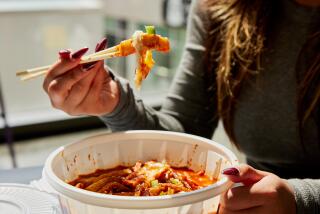Suit Says Anti-Asian Bias Lead Downey to Challenge Mall
DOWNEY — An Asian businesswoman has sued the city, accusing municipal officials and local businessmen of conspiring to keep her from opening a shopping mall because of “prejudice and bias” against Asians.
Attorneys for Laura Kim, the leaseholder of the Downey Galleria, filed a lawsuit May 20 in Superior Court seeking to compel the city to issue business permits to her tenants in the refurbished bowling alley on Firestone Boulevard.
The intent of the alleged conspiracy was to prevent Kim and shop operators from opening to “compete with white mall operators and white-owned retail businesses in the City of Downey,” the suit said. Kim is Korean and many of her tenants are Asian.
Downey officials maintain there was no conspiracy, and that only three businesses in the mall have been licensed because Kim has not met some of the city’s requirements.
“There’s no substance at all to (the racism) allegation that I’m aware of,” City Atty. Carl Newton said.
Regarded as Flea Market
At the center of the conflict is the city’s belief that Kim will operate the development as a “flea market,” which would require a conditional use permit. Kim says the Galleria is like other malls in Downey that operate without one.
Kim holds a 20-year lease on what was once the Wonderbowl, a property that had been vacant for more than two years. Kim said she has spent more than $500,000 converting the 78,000-square-foot building into a mall that includes a restaurant and bakery, a banquet room, 11 small shops and eight vending kiosks.
The businesswoman contends that discriminatory treatment began while she was converting the bowling alley and prevented the mall from opening as planned.
The suit alleges that city building inspectors did not tell Kim during construction that four ramps for the handicapped failed to meet city grade requirements. Kim had to rebuild the ramps at a cost of $60,000, the lawsuit said.
The purpose was to “harass Mrs. Kim, cause her needless expenses, and prevent her and her subtenants from opening up the mall and its businesses,” the lawsuit said.
“The conduct that is occurring is inexplicable except for what we believe to be pressure from competitors,” said Dale L. Gronemeier, Kim’s lawyer.
Permit Requirement Cited
But Downey officials say Kim was treated the same as any developer, and that the key to her problems was her failure to secure a conditional use permit to run her mall as a so-called flea market.
Newton said that based on a description of the business Kim gave to the Planning Department, she was advised in September that the project would require a conditional use permit.
A flea market generally is marked by several vendors selling out of a single shop, which is what Kim told the city she planned for the mall, said Jim Cutts, director of Community Development.
Kim said she altered her original concept, which was to have a marketplace for vendors in the renovated bowling alley. Now, the building is divided into shops. Some shops will be traditional retail businesses. In others, there will be multiple vendors; the individual shop will be leased to a single corporation owned by the vendors, she said.
“That ain’t no flea market or swap meet,” Gronemeier said. “It’s a high-quality, class mall development.”
Kim said she had applied for a conditional use permit but did not follow through because she believed that her plan would not be approved.
The businesswoman also contends that other malls in Downey have not been classified as flea markets even though they contain stores with more than one vendor.
Cutts said the city is still reviewing the operation, adding, “It’s a tough definition, admittedly.”
Meanwhile, the Downey Galleria is slowly coming to life. The city issued business licenses Thursday morning for a restaurant Kim operates, and for a snack bar and an ice cream parlor run by Galleria tenants.
Cutts said the city granted the three business licenses because each is run by separate tenants.
“There is nothing right now that shows us she has multiple tenants in each of the shops,” he said.
Kim said she went ahead and opened the restaurant on May 22, two days after the lawsuit was filed. Other operators--who do not have business licenses--were open for business last week although it appeared many were still arranging their shops.
She said she hopes the city will grant business licenses to the rest of the operators but figures that she has already lost more than $100,000.
Held Ready a Month Ago
Kim contends that the mall was ready to open for business on April 28, when the city issued a partial occupancy permit allowing shop owners to begin moving in equipment for their businesses. But some tenants moved out as Kim and the city haggled over whether or not she needed a conditional use permit.
“We leased 80 to 90%, but they moved out because of the delay,” Kim said in a recent interview in the partially occupied mall. “I had to refund over $100,000 in deposits.”
Kim said about 40% of the shop space is filled. The mall’s grand opening is scheduled for June 18.
Cutts said the city would take action if it were determined businesses were operating illegally.
The lawsuit also seeks damages from Downey. But Gronemeier said all Kim wants is “to run a business and if the city permits her to do that, she’s not interested in going after them for damages.”
Cutts, City Manager Don Davis and other officials are defendants in the lawsuit.
More to Read
Sign up for Essential California
The most important California stories and recommendations in your inbox every morning.
You may occasionally receive promotional content from the Los Angeles Times.









